On July 12th 1736 Admiral John Norris, Commander-in-Chief of His Majesty’s Ships on board HMS Pembroke in the Tagus estuary, ordered the commanders of other ships in the Fleet to stop their men going ashore and upsetting the local population by playing cricket. This is the first reference to cricket being played in the country.
The next is not until August 9th 1810 when a certain Surgeon Boutflower FRCS, attached to British troops stationed in Portugal during the Peninsular War, mentioned in a letter that he and his fellows played cricket near Almeida. Neither of these instances led to cricket developing a permanent presence in Portugal.
This had to wait until the 1850s when British merchants formed the Oporto Cricket Club in 1855. The club lasted only three years but was reformed in 1861 to meet a challenge put out by the Lisbon Cricket Club which was founded in 1860. The challenge was taken up on June 17th 1861, when nine of the Oporto players travelled by sea, whilst the other two, who were prone to sea-sickness, travelled by horse-drawn carriage in a 33-hour journey to Carregado, the railhead 40 kilometres north of Lisbon. Oporto won the match which was played at Campo Pequeno, now the site of the Lisbon bull ring. Clearly, such a journey wasn’t for the faint-hearted and Lisbon did not take up the return fixture until 1867 by which time the railway between Lisbon and Oporto had been completed, and the matches subsequently became an annual fixture.
During the 1870s and 1880s the Lisbon and Oporto clubs played matches against the officers of various British ships visiting the ports. The first combined team, representing Portugal, took the field at Oporto in 1895 against T Westray’s XI, a privately-managed side, close to first-class standard, assembled in England, to play cricket in Portugal in country-house style, whilst at the same time, enjoying the local scenery and wine. Westray’s side won the match against eighteen of Portugal by 91 runs. In 1898 Westray brought an even stronger team, including two England cricketers, PF Warner and HR Bromley-Davenport, plus several county players. They met Portugal on equal terms, and won, not surprisingly by an innings and 75 runs.
Nevertheless, Westray started a fashion for British teams to visit the country. HD Swan brought a side in 1910, with the Cryptics visiting in 1924, 25, 30 and 39. Westray’s came again in 1928, a side raised by HDG Leveson-Gower in 1934, the Gentlemen of Worcestershire in 1936 and Gibraltar in 1936 and 39. None of these teams however met an all-Portugal side, although Gibraltar played against teams styled ‘Oporto ad Lisbon’ drawing in the 1937 game and winning by eight wickets two years later.
After the Second World War, the visits of sides from Britain continued but the local standard was in decline. Cricket suffered from being played by a small number of expatriates in rather exclusive clubs with high membership fees. At the same time, the number of British residents was falling and there was also a severe shortage of grounds. Following political upheavals in 1974, membership of the Lisbon Sports Club declined as the various multinational companies in Portugal stopped employing as many expatriates. With a decreasing and ageing membership at both Lisbon and Oporto, cricket seemed to have little future.
The overthrow of the Portuguese government and the establishment of democracy in 1974 was followed by the granting of independence to their colonies. This lead to the migration of Portuguese nationals from Goa and Mozambique, including many who had learned to play cricket. Many Portuguese expatriates of Angola and Mozambique also moved to Rhodesia and South Africa where their children were introduced to the game. As the political situation in these countries changed, these people too migrated to Portugal, so by the late 1970s there was a reservoir of people interested in reviving the game.
Portugal returned to the international scene with the Cricketer Cup in 1992, and the following year a three-day match was played against Spain at the newly-established cricket and sports facility at Barrington’s in the Algarve. The Federacao Portuguesa De Cricket was formed on June 19th 1994, and they were granted Affiliate Membership of the ICC in 1996.
They won the ECF Nations Cup in 1995 with the team containing six players from Mozambique and three from Portuguese India, and they finished runners-up in the same competition the following year. In a match against Greece in 1997 they scored 381 for 3 against Greece, with Tobern Rankine making 173 not out.
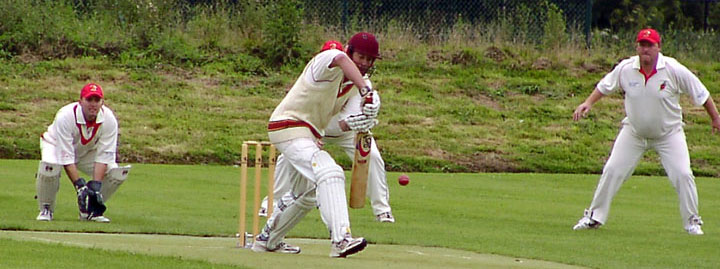 Torbine Rankin batting
Torbine Rankin batting
They took part in the 1999 ECC Trophy where after beating Malta, Sweden and Switzerland, they were beaten by Greece in the final. Highlight was a brilliant century by Nadeem Butt in their semi-final win against the Swiss.
Their squad was as follows: Akbar Saiyad, Tobern Rankine, Gamlesh Ramchande, Ramesh Bhagvan, Nelson Ferreira, Dinesh Maugi, Jitesh Backrishna, Carlo Buccimazza, Paulo Buccimazza, Mario Sahtilal, Mehbi Intesab, Humayun Shahzad, Nadeem Butt.
They played in the 2000 European Division Two championships in Glasgow, beating Greece and Israel to finish fourth.
Their squad pen pics for the tournament was as follows:
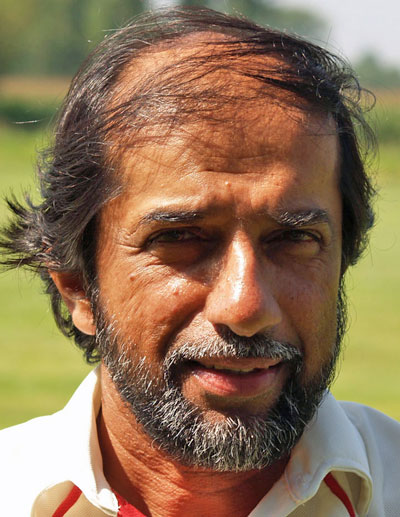 Akbar Sayad
Akbar Sayad
- Akbar Saiyad (captain): Right hand bat and reserve wicketkeeper who has been captain of the national side since Portugal officially entered international cricket at the ECF Trophy in 1993. Akbar was born in Lourenco Marques when Mozambique was still a Portuguese colony and is therefore a Portuguese citizen from birth.
- Ramesh Bagvanedaia: Right hand bat and right arm bowler. Born in Mozambique when it was still a Portuguese colony and therefore a Portuguese national, Ramesh came to Portugal as a youth. He quickly established himself as a cricketer of great potential and has been an automatic choice for the national team since first representing Portugal at the ECF Trophy in Durham in 1993. Although currently living in London, Ramesh retains strong ties with his mother country and participates in local cricket as frequently as he is able.
- Haleem Butt: Right hand bat and right arm bowler. Born in Pakistan but resident in Portugal for seven years, Haleem is a newcomer to the Portuguese national squad. His aggressive batting style and enthusiastic approach have brought him into prominence this season, having been on the verge of national selection for the past two seasons. He is the younger of the two Butt brothers in the squad.
- Camlesh Ramchande: Right hand bat and right arm pace bowler. Born in Mozambique and raised in the Portuguese enclave of Goa in south west India, Camlesh has been a Portuguese citizen from birth. He first represented Portugal at the ECF Trophy in Oxford in 1995.
- Nazir Ushan: Right hand bat and right arm bowler who was born in Mozambique, Nazir first represented Portugal in the ECF Trophy at Zuoz in 1997. A Portuguese national, he is now living and working in London.
- Jay Da Costa: Wicketkeeper and right hand bat. He is making his first appearance at international level. Currently studying European Politics at Portsmouth University in England, Jay was born in Birmingham of Portuguese parents and is a Portuguese citizen.
- Nadeem Butt: Right hand top order bat and right arm medium pace bowler. Nadeem made his first appearance for Portugal at the 1997 ECF Trophy and has been a regular member of the side ever since. A native of Pakistan, he has lived in Portugal for eight years and is married to a Portuguese girl.
- Paulo Buccimazza: Right hand bat and left arm bowler who was born in Cape Town but registered as a Portuguese national from birth. Paulo has just left school and is aiming to enter Lisbon University to study Sports Science. He first represented Portugal in the ECC Trophy at Zuoz in 1998 and has also been a regular member of the national 6-a-side indoor squad.
- Torbine Rankin: Left hand open bat and occasional right arm bowler. Born in Lisbon, he is vice-captain of the team. First represented Portugal at the ECF Trophy in 1995 and has been an ever-present since. Also captained the Portuguese 6-a-side indoor cricket squad in the last three European tournaments. He is also a Portuguese national rugby player.
- Humayun Shahzad: Right hand bat and right arm bowler. Native of Sialkot, Pakistan, he has been resident in Portugal for eight years and a regular in the national team since first qualifying. First represented Portugal in the ECC Trophy in Zuoz, Switzerland.
- Dinesh Maugh: Right hand bat and right arm pace bowler who was born in Mozambique and raised in Lisbon. He has lived in Holland and England for the past four years but has recently returned to Portugal on a permanent basis. He first represented Portugal in the 1995 ECF Trophy and has been a regular team member ever since then.
- Intesab Mehdi: Right hand bat and right arm bowler. Born in Pakistan but resident in Portugal since 1988 and a Portuguese citizen. Mehdi has been a stalwart of the national side for several seasons, having first represented Portugal in 1995.
- Nelson Ferriera: Right hand bat and occasional right arm bowler. Born in Johannesburg of Portuguese parents and a citizen from birth. He first represented Portugal in the ECC Trophy in Zuoz and has been a regular member of the national indoor squad, holding two Champions' medals from 1997 and 1998.
- Edward Chambers: Right hand bat and right arm bowler. Born in Oporto in June 1980. Represented Portugal against the visiting MCC side in 1999 and is currently studying Modern Languages at Leeds University. The only Oporto-based member of the side, Ed is the youngest member of a family with a long history of association with cricket in Portugal.
They proved very adept at Indoor cricket, winning the ICC Europe tournament three times, while also losing twice in the final to Denmark.
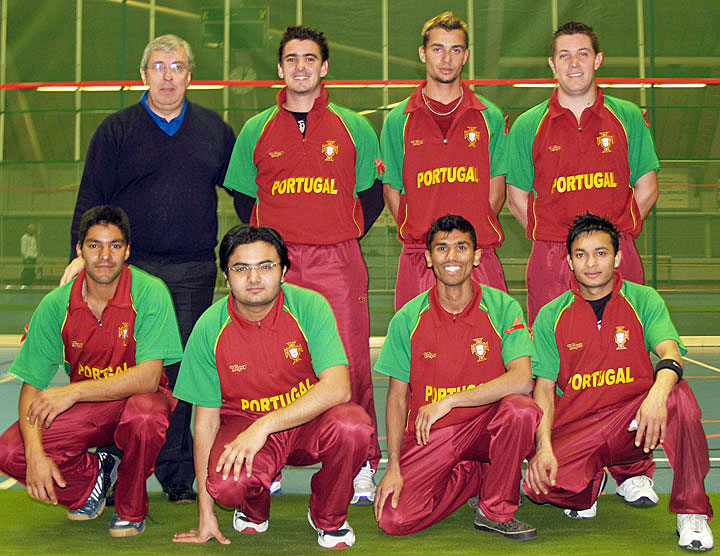 Portugal's 2006 European Indoor squad
Portugal's 2006 European Indoor squad
They won the 2001 ECC Trophy in Vienna, beating Austria by nine wickets in the final with Nadeem Butt (91*) and skipper Akbar Saiyad (44) breaking the back of the chase with an opening stand of 126. Butt also made 110 in their win against Sweden, while Torbine Rankine made 104 not out versus Finland. Intesab Mehdi was another centurion as he and Rankine (87) added 190 in the win over Malta.
They played again in European Division Two in Northern Ireland back in 2002, where they won three games to finish third, beating Israel, Gibraltar and Israel. Nadeem Butt (153 runs) was their leading scorer, While Humayun Shazad (11 wickets) was their most successful with the ball.
They didn’t enjoy the 2003 ECC Trophy where they finished fifth, having lost both their group games. It was a similar story in the 2005 Affiliates (aka Division Three) tournament in Belgium where they again were placed fifth. Highlight was a third wicket stand of 188 in their win over Malta where Tariq Aziz (115) and Rizwan Khaliq (100) both made hundreds. Nadeem Butt was their leading wicket taker with 12, including a five wicket haul in a six-run loss against the hosts, while wicket-keeper Jay De Costa had five dismissals (4 cts, 1 stumping) in the loss to Norway.
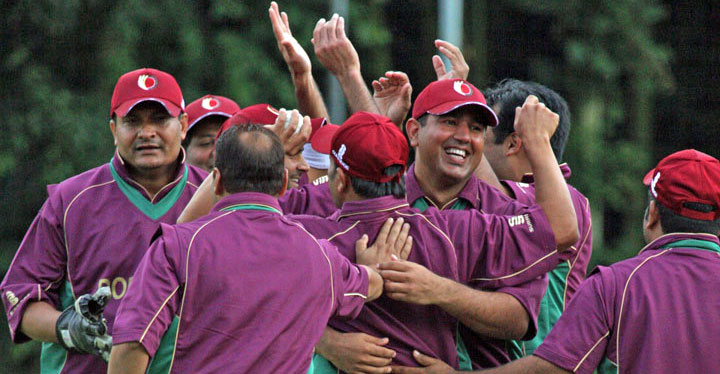 Portugal celebrate a dismissal against the Isle of Man
Portugal celebrate a dismissal against the Isle of Man
They returned to Belgium in 2007 where they managed a relatively disappointing sixth slot, losing to Croatia and Finland in the group stages. They did manage a win over Cyprus in the placings thanks to five wickets from Bilal Khan and 87 from Nadeem Butt, but lost against Belgium despite five wickets from Mirza.
They made the short trip to La Manga for the 2009 Division Three competition but managed only one win to finish fifth in the six-team event. That victory was in the Iberian derby where Nadeem Butt hit 69 in a last-over thriller – Butt also made 87 in a loss to Belgium.
They were back in Belgium for Division Two in 2011 – now a T20 tournament - where they finished fourth. They had wins over Cyprus and Finland in the group stages to progress. They suffered an awful drubbing in the semi-final against Belgium (145 runs), but performed better in only losing by 13 runs to the Isle of Man.
The 2012 Division Two competition was held in Corfu where they were placed seventh. Group wins were achieved against Luxembourg, Estonia and Malta, while they lost to Spain and Israel. In the placings they lost to Finland, before finishing on a winning note, beating Estonia for a second time. Tariq Aziz (242) was their highest run scorer, while Jose Ricardo Pais and Muhammad Mirza each took four wickets in an innings.
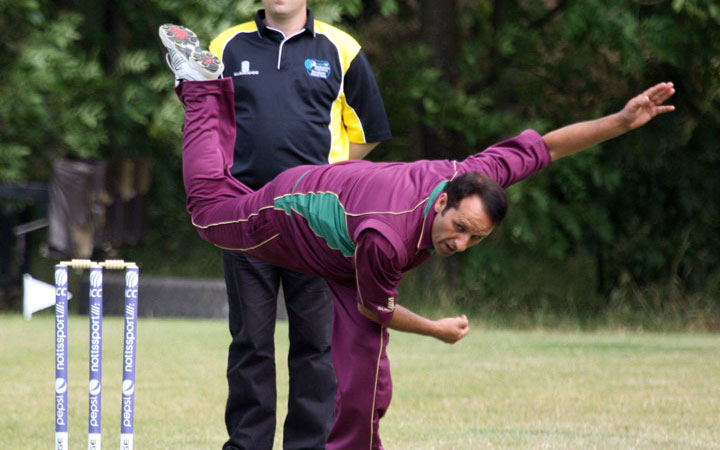 A triskellion from Muhammad Mirza
A triskellion from Muhammad Mirza
They fell victim to the ICC Europe tournament cull and weren’t seen again until 2018, when they were part of the 18-team competition in The Netherlands which served as a T20 World Cup pathway event.
They were placed in Group A, where they managed to beat Austria, but lost to Denmark, Germany, France and Cyprus.
Granted Associate status by ICC they played four T20 Internationals in 2019, where they lost twice to Spain, and beat Gibraltar twice. They are currently placed 63rd in the latest ICC Rankings.
This article was written by Roy Morgan in 2006 and has been updated by CricketEurope.

